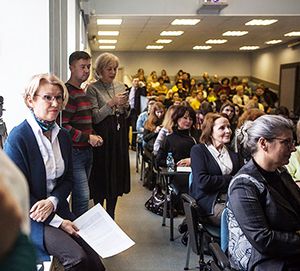The women s issue in Russia and Germany: Past and Present
March 18, 2019
 St Petersburg University has hosted an international conference dedicated to the 100th anniversary of the enfranchisement of women in Russia and Germany. The conference was attended by representatives of public and academic communities from both countries.
St Petersburg University has hosted an international conference dedicated to the 100th anniversary of the enfranchisement of women in Russia and Germany. The conference was attended by representatives of public and academic communities from both countries.
The participants of the conference were welcomed by Sergey Andryushin, Deputy Rector for International Affairs, St Petersburg University. “Nowadays, it seems inconceivable that a hundred years ago women did not have voting rights. The conference, which is being held today at St Petersburg University, is designed to answer many questions and identify the problems that women encountered in the past and are currently facing,” said Sergey Andryushin.
He emphasised that it was at St Petersburg University in 1878 that the first Higher Bestuzhev courses for women were opened in Russia. From then on, many of its graduates determined the fate of our country.
"Today, half of the University’s management team are women. As we see, St Petersburg University provides women with every opportunity for professional fulfilment", - said Sergey Andryushin, Deputy Rector for International Affairs, St Petersburg University.
Carola Veit the President of the Hamburg Parliament, welcomed the participants of the conference from the German side. She spoke about the history of women's suffrage in Germany. Ms Veit reminded that up to the beginning of the 20th century when people spoke of the concept of human rights, they meant only men. Klara Zetkin, an activist and advocate for women's rights, used to be called "the most dangerous witch of the German Empire". However, in 1919 in the parliamentary elections of the Weimar Republic 80% of voters were women. It was the first time when the right to vote was given to the female electorate.
“It turned out that women were interested in participating in the election process: they were mostly concerned about the military issue,” said Ms Veit. She added that at that moment only 9% of the elected deputies were women and even two generations later the situation did not improve. “The number of women in the Bundestag exceeded the 10% threshold only 70 years later. Today they make up about a third of the deputies,” said Carola Veit.
The conference participants also discussed the development of St Petersburg and Hamburg with relation to the women's issue. They considered what connects the two cities today regarding the observance of women's rights, and the distribution of gender roles in families, at work, and in culture. The history of the women's movement in St Petersburg in the 20th century was presented by: Natalia Khodyreva, Associate Professor, St Petersburg University; Irina Iukina, Associate Professor, National Research University Higher School of Economics; and Diana Balibalova, Professor, St Petersburg University of the Humanities and Social Sciences.
The event was also attended by: Nadezhda Tikhonova, a member of the Legislative Assembly of St Petersburg; Olga Shtannikova, Chief of Staff, the Human Rights Ombudsman for St Petersburg; Susanne Hesemann, representative of Hamburg’s Diakonia; representatives of the Evangelical Lutheran Church in Northern Germany; Barbara Voigt, an ex-editor of the oldest German magazine for women Brigitte; Hanna Klimpe, Professor at Hamburg University of Applied Sciences; as well as scientists and public figures of the two countries. The moderators of the event were: Svetlana Bodrunova, Professor of St Petersburg University; and Rima Sharifullina, the leader of the St Petersburg Women's Club.
So far no comments


